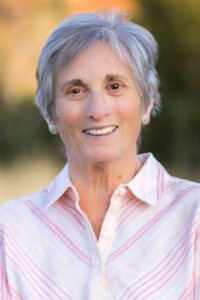
GenderAvenger’s app allows users to tally the number of females represented at conferences, public events, and other spaces, and converts those numbers into polished pie charts and tweets — all to prevent manel issue. (Photo Credit Adobe Stock)
The first time Gina Glantz used social media to call attention to the lack of female representation on a conference panel, she was “rebuked,” recalls Glantz, the founder of the nonprofit initiative GenderAvenger.

Gina Glantz
That was nearly seven years ago, when Glantz, a veteran political campaign strategist and consultant, was a lecturer at the Shorenstein Center on Media, Politics and Public Policy at Harvard’s Kennedy School. When the school’s Institute of Politics announced a lineup of five white male speakers for a prestigious panel, “well,” Glantz said, “that just sent me around the bend.”
In response, she fired off a Facebook post, pointing out that the institute had overlooked and excluded highly qualified women from the panel. After a power outage forced the panel to be postponed, Glantz wrote another post, attributing the turn of events to divine retribution. When her widely circulated posts got the attention of influential people, Glantz was called on the carpet for her critique. That didn’t faze her, Glantz said, but the experience did sensitize her to how wherever she looked, men dominated the public dialogue — and that there was a price for speaking up.
When Glantz, who is 76, began to talk with others about the issue, including women decades younger than herself, “They all said the same thing,” she told Convene. “Which was: ‘Oh, yeah. We go to a conference and there are only men on stage. And if you say something, you are dismissed, you are diminished, you are disparaged — and you are not invited back.’”
Glantz kept thinking about how she could use her organizing skills to take action over the next couple of years, and then a friend gave her a big nudge — he designed the website which became the first iteration of genderavenger.com. With that, and a list of 200 email addresses, Glantz went to work. By 2015, she had officially cofounded GenderAvenger with entrepreneur Susan Askew, and hired a web designer. (Both Askew and Glantz work as volunteers and GenderAvenger is now supported by Women OnLine, a consulting firm.)
GenderAvenger’s strategy was intentionally simple: An app allows users to tally the number of females represented in the conferences, public events, and other spaces they found themselves in, and converts those numbers into polished pie charts and tweets. Users can send them as messages on their own networks, drawing attention to the issue of gender equity and representation. GenderAvenger sends out “action alerts” each week via an email newsletter advising readers and the website publicizes the data that users collect. “GenderAvenger has no ideology,” Glantz said. “None. It’s all about counting. Because when you count what you see, the numbers don’t lie.”
From Snark to Kudos
GenderAvenger has never been shy about calling out events and other public forums that fail to include women’s voices, including labeling an event “a thunderstorm of inequality” when the proportion of females fell below 30 percent. Initially, conference organizers and publications reacted defensively at the exposure, Glantz said. But conference organizers’ anger could backfire, as it did when GenderAvenger tweeted about the lack of female representation at a fiscal summit, and organizers blocked GenderAvenger’s Twitter account. There were so many protests that GenderAvenger became a trending topic at the conference and their account was unblocked, Glantz said, “It was one of the best things that ever happened to little GenderAvenger.”
Last year, Convene spoke to Glantz in the aftermath of controversy over the 2018 keynote speaker lineup at CES, the giant consumer technology show, which consisted of six white males. The protests on social media and editorials — like one that Glantz wrote for USA Today — created so much pressure that CES’s organizers wrote a letter, addressed to Glantz, promising that they would do better. CES delivered, with a 2019 roster of keynote and featured speakers that included 45 percent women, 60 percent of whom were women of color, and which earned them a “Gold Stamp of Approval” from GenderAvenger.
In the last few months, “something extraordinary has begun began to happen,” Glantz said. Where conference organizers such as CES used to react angrily and offer up excuses when GenderAvenger publicized their lack of diversity, more now say, “We screwed up. We’ll do better,” Glantz said. That’s not to say that the problems of gender representations are disappearing. Every week, when GenderAvenger sends out action alerts advising its readers about conferences and publications with gender imbalances, there are plenty to highlight, she said. But “there has been a shift and it’s very positive.”
GenderAvenger also has evolved since it was founded, Glantz said. “We’ve been lucky in that the team, we’ve all gotten older over the last four years, but there is a range of age and experience. The people who are part of it represent the diversity of the community we’re trying to reach.” GenderAvenger’s IT director is male, and the site includes a pledge which more than 600 men have signed, promising that they won’t be a part of a panel of three or more speakers if there are no women included.
GenderAvenger added a tiered system of stamps of approval at the recommendation of Askew. “She really wanted us to do something positive,” Glantz said. Another staff member, a non-binary individual, insisted — and kept insisting — to Glantz “that we had to find a way to include that count in the tally as well,” Glantz said. “We had added women of color. And she said, ‘We need to add non-binary.’ She just made me understand the value of acknowledging the community and becoming fully inclusive.”
- Learn more about GenderAvenger at genderavenger.com. An interview with Glantz will be featured as part of PCMA’s Ascent Luminaries video series.
- Mark Baker’s blog post about male-only gatherings can be found at convn.org/speaker-withdraw.
